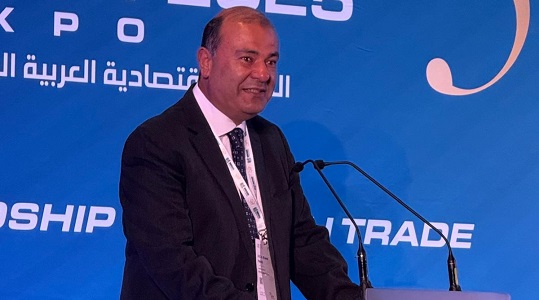Dr. Khaled Hanafy, secretary-general of the Union of Arab Chambers, affirmed in his opening speech at the fourth Arab–British Economic Summit, held at the Hilton London Metropole on June 23, 2025, and attended by a large Arab and British delegation of officials, business leaders, and investors, that: “As we find ourselves at a defining moment—where the world faces unprecedented challenges such as climate change, geopolitical realignments, and rapid digital acceleration—what is required from Arab countries and the United Kingdom is to move beyond traditional trade toward a model rooted in innovation, sustainability, and mutual investment in human capital.”
The secretary-general of the Union noted that: “Trade between the United Kingdom and the Arab world today exceeds £74 billion, with the Gulf Cooperation Council (GCC) countries alone accounting for more than 80% of that figure. However, we recognize that numbers alone are not enough. Our higher goal is to achieve sustainable, inclusive, and resilient growth—which means prioritizing investment in green infrastructure and the circular economy, ensuring gender equality, empowering youth in the workforce, and strengthening public-private partnerships that generate long-term added value.”
Dr. Khaled Hanafy explained that: “The Arab region possesses strong human capital, a robust demographic structure, and a powerful drive for diversification. The United Kingdom, on the other hand, brings deep expertise and world-class innovation. From this foundation, we can jointly build a shared economic future. The United Arab Emirates and Saudi Arabia are currently the UK’s largest Arab trading partners, driven by their growing exports in energy, services, and investment.”
He revealed that: “Machinery, vehicles, pharmaceuticals, financial services, and education dominate the United Kingdom’s exports to the Arab world. Meanwhile, the UK’s imports from the region mainly consist of energy (including oil, gas, and petrochemicals), gold, and agricultural products. Investment flows are strong in both directions: major Arab sovereign wealth funds are investing in infrastructure, real estate, and technology across the UK, while British companies are active in infrastructure, finance, and education throughout the Gulf region. Tourism and education are also key sectors—more than 50,000 Arab students study in the UK each year, and millions of Arab tourists visit annually.”
In his speech during the first session, titled “Innovation in Energy” as part of the fourth Arab–British Economic Summit, the secretary-general of the Union, Dr. Khaled Hanafy, emphasized that: “The Arab world is at a pivotal stage. While Arab economies have long relied on hydrocarbons, we are now leading efforts to adopt renewable energy through massive investment projects that not only aim to reduce emissions but also to build resilient, future-ready economies. The Arab region is expected to invest over $2 trillion in clean energy by 2030, which will generate millions of jobs and attract global partnerships.”
He noted that: “Arab–British cooperation can be strengthened by widely applying the principles of the circular economy across various sectors—from tourism to manufacturing. The UK’s expertise in waste management and recycling technologies presents a promising opportunity for collaboration. Cooperation can also be elevated through smart grids and digital transformation. In the tourism sector, smart energy solutions can help reduce both costs and carbon footprints. The UK’s leadership in offshore wind energy and carbon capture can complement the Arab world’s expertise in solar power and green hydrogen. Public-private partnerships can provide large-scale infrastructure, and both Arab countries and the UK can apply this model to regional smart grid networks and waste-to-energy projects. This aligns with the UK’s commitment to invest £20 billion in carbon capture and storage (CCS) and with the GCC countries’ plans to produce blue hydrogen.”
The secretary-general called for: “Harmonizing regional regulations to attract green foreign direct investment (FDI)—similar to the unified tourist visa adopted by the Gulf Cooperation Council (GCC) countries. He also proposed establishing an Arab–British clean energy fund to co-finance pilot projects in solar energy, hydrogen, and smart cities. In addition, he advocated launching an initiative titled ‘Energy Innovation Skills’, which would link British universities with Arab vocational training centers to build workforce capacity in the energy sector.”
Dr. Khaled Hanafy concluded his remarks by saying: “Innovation in energy is not just about technology—it’s also about transformation: how we support our economies, empower our people, and protect our planet. In this regard, the Arab world and its private sector are ready to lead this journey, and the United Kingdom is an indispensable partner along the way.”
During the summit, participants in the first session discussed topics including clean and cost-effective energy sources, energy recovery from industrial and household waste, sustainable projects, and the circular economy in the energy sector. The session also emphasized the importance of improving energy efficiency and reducing emissions by increasing investments in renewable energy and smart grids using the latest technologies.
The second session brought together a panel of experts in artificial intelligence, who examined trends in real estate investment, the growth of smart cities, the impact of digitalization on business operations, risk mitigation, policy responses for data protection, and the role of human capital in the age of AI.
The third session focused on ways to strengthen trade between the United Kingdom and the MENA region, and highlighted the importance of innovation, infrastructure, and modern business hubs in building future partnerships.
In the fourth session, experts explored how investing in human resources can equip the next generation with the skills needed for success in the job market. The session also discussed how emerging technologies in healthcare can meet public needs and improve the efficiency of service delivery.
The final session addressed the rapid transformation of banking and financial services under the influence of AI, alongside the continued growth of fintech and e-commerce.
This fourth summit coincided with the 50th anniversary of the Arab–British Chamber of Commerce, which was established to promote bilateral trade and investment relations between the UK and the Arab world.
Source (Union of Arab Chambers)

